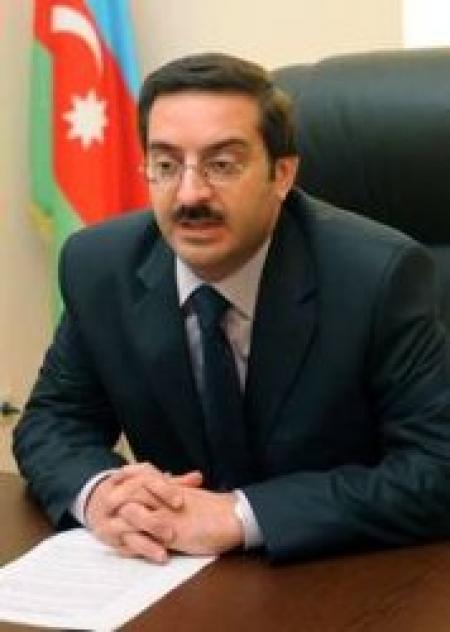ID :
120004
Mon, 05/03/2010 - 13:29
Auther :
Shortlink :
http://m.oananews.org//node/120004
The shortlink copeid
Aliyev advisor strongly backs continued diplomacy on Iran

Berlin, May 3, IRNA - A key advisor to Azerbaijan's President Ilham Aliyev vowed his country's strong support for continued diplomacy on Iran geared at ending the deadlock over Tehran's nuclear program.
Elkhan Nuriyev who heads the Baku-based Center for Strategic Studies under the President of the Republic of Azerbaijan, said in an interview with IRNA in Berlin that he supported "the idea of continuing the negotiation process" with the Islamic Republic of Iran.
"We strongly believe that talks should continue and I think there is a lot of potential to continue the negotiation process with the Islamic Republic of Iran to discuss in detail what should be done. We don't want to see a new cycle of instability or destabilization around Iran," he went on to say.
Asked about US plans to step up sanctions against Iran, Nuriyev pointed to the impact of such punitive measures on the state of security in the Caspian and Middle East regions.
"The question is whether new sanctions will improve the security situation in the Caspian-Caucasus basin and even the greater Middle East," he said.
Nuriyev labeled Iran as a "strategic actor and very important player" in the Caspian and Caucasus region as well as the greater Mideast.
"Iran remains a vital geopolitical actor in the South Caucasus and we have very pragmatic, successful relations with the Islamic Republic," the Aliyev's aide said.
Nuriyev voiced Baku's "interest in expanding cooperation" with Tehran.
Meanwhile, he welcomed Iran's recent proposal to mediate in the
Nagorno-Karabakh conflict but said his country was still waiting for
"a concrete concept (from Iran) on how to move forward" in resolving the conflict between Azerbaijan and Armenia.
The expert urged Iran to use its influence on Armenia "to make a compromise" aimed at a conflict resolution with Azerbaijan.
Nuriyev stressed that resolving the Nagorno-Karabakh conflict remained "the main priority" on Baku's foreign policy agenda.
On the role of Caspian sea gas for Europe, Nuriyev said the planned Nabucco gas pipeline could secure European energy needs.
He warned against attempts to politicize the project as the US is actively torpedoing efforts to include Iran in the venture.
"It's a commercial project. It's open to other countries, regional and non- regional. Iran is a regional country and could also benefit from the project," Nuriyev added.
Expected to cost around 7.9 billion euros, the 3,300-kilometer Nabucco pipeline is scheduled to bring 31 billion cubic meters of Caspian and Middle Eastern gas a year from Turkey to an Austrian gas hub via Bulgaria, Romania and Hungary by 2014.
The project is backed by the European Union as a way of lowering its
dependence on Russian gas./end
Elkhan Nuriyev who heads the Baku-based Center for Strategic Studies under the President of the Republic of Azerbaijan, said in an interview with IRNA in Berlin that he supported "the idea of continuing the negotiation process" with the Islamic Republic of Iran.
"We strongly believe that talks should continue and I think there is a lot of potential to continue the negotiation process with the Islamic Republic of Iran to discuss in detail what should be done. We don't want to see a new cycle of instability or destabilization around Iran," he went on to say.
Asked about US plans to step up sanctions against Iran, Nuriyev pointed to the impact of such punitive measures on the state of security in the Caspian and Middle East regions.
"The question is whether new sanctions will improve the security situation in the Caspian-Caucasus basin and even the greater Middle East," he said.
Nuriyev labeled Iran as a "strategic actor and very important player" in the Caspian and Caucasus region as well as the greater Mideast.
"Iran remains a vital geopolitical actor in the South Caucasus and we have very pragmatic, successful relations with the Islamic Republic," the Aliyev's aide said.
Nuriyev voiced Baku's "interest in expanding cooperation" with Tehran.
Meanwhile, he welcomed Iran's recent proposal to mediate in the
Nagorno-Karabakh conflict but said his country was still waiting for
"a concrete concept (from Iran) on how to move forward" in resolving the conflict between Azerbaijan and Armenia.
The expert urged Iran to use its influence on Armenia "to make a compromise" aimed at a conflict resolution with Azerbaijan.
Nuriyev stressed that resolving the Nagorno-Karabakh conflict remained "the main priority" on Baku's foreign policy agenda.
On the role of Caspian sea gas for Europe, Nuriyev said the planned Nabucco gas pipeline could secure European energy needs.
He warned against attempts to politicize the project as the US is actively torpedoing efforts to include Iran in the venture.
"It's a commercial project. It's open to other countries, regional and non- regional. Iran is a regional country and could also benefit from the project," Nuriyev added.
Expected to cost around 7.9 billion euros, the 3,300-kilometer Nabucco pipeline is scheduled to bring 31 billion cubic meters of Caspian and Middle Eastern gas a year from Turkey to an Austrian gas hub via Bulgaria, Romania and Hungary by 2014.
The project is backed by the European Union as a way of lowering its
dependence on Russian gas./end





